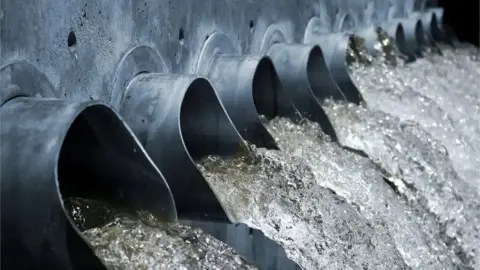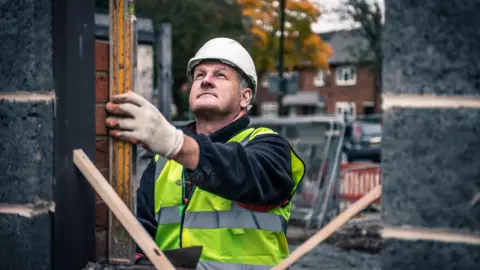Scepticism over Stormont plan to deal with NI's water infrastructure
 Getty Images
Getty ImagesMembers of Northern Ireland's budget watchdog have expressed scepticism about the Executive's main proposal to deal with a water infrastructure crisis.
The Infrastructure Minister, Liz Kimmins, is consulting on a plan to make all housebuilders in Northern Ireland pay into a wastewater infrastructure fund.
Sir Robert Chote, who chairs the Northern Ireland Fiscal Council, told assembly members "it doesn't seem very likely" that it will raise the sort of money needed to transform the system.
"It could help at the margin, but it is not as much of a gamechanger as something bigger on regional rates or domestic charging," he said.
His colleague, Prof Alan Barrett, said that is it likely the cost of levy would end up being passed through to house buyers "in some shape or form".
He said it was a question of "tax incidence" - an economic term to describe the difference between who legally pays the tax and who actually bears the economic cost.
He added: "Although a levy can be applied to one group it can actually manifest to the other."
Speaking in March, Ms Kimmins acknowledged that developer payments alone would not solve the problems but would be a "step forward on the journey towards having the infrastructure we all need".
Northern Ireland is the only part of the UK where households do not pay directly for their water.
Instead, NI Water receives a government subsidy which diverts more than £300m annually from the Executive's budget.
Shortfall in wastewater infrastructure
 Getty Images
Getty ImagesPersistent underfunding of NI Water has led to a shortfall in the wastewater infrastructure, which in turn, is limiting house building and other development.
The Fiscal Council has produced a report concluding that NI Water's current funding model is not fit for purpose.
Prof Barrett suggested the Stormont Executive could look outside the UK and Ireland for a better funding model.
He said that on the island of Ireland there are water systems "where we just give the water away which is rarely a great idea".
"In England there's a particularly radical form of privatisation which you can argue hasn't worked terribly well either."
He pointed to water charging in the wider EU where there are a variety of models including metering.
"In terms of looking to the future there are probably a whole lot of models which work rather seamlessly it's just that we're closer to the ones that are particularly dysfunctional," he added.
